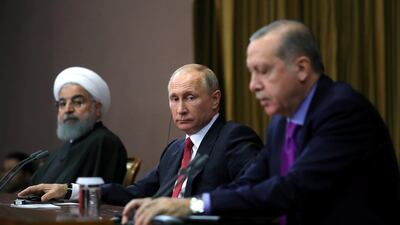In 2015, Turkey was a leading exponent of regime change in Syria, in opposition to Russia and Iran, powerful backers of Bashar Al Assad. That November, Moscow reacted with fury when a Russian jet was shot down by Turkey over the Syrian-Turkish border. Today, as Russian President Vladimir Putin sits down for talks with his Turkish and Iranian counterparts in Ankara, the world looks a very different place and the alliances that buttress it have changed dramatically. Relations between Turkey and its Nato allies are at an all-time low, thanks to Turkey's undue aggression in Syria and President Recep Tayyip Erdogan's delusional authoritarianism. Meanwhile relations between Russia and the West are at their lowest ebb post-Cold War, following the poisoning of a former Russian spy in the English town of Salisbury. Isolation has driven the two volatile aggressors closer together. And Iran joining them at the table is a worrying sign of murky alliances being forged on the anvil of Syrians' despair.
Yesterday Mr Putin and Mr Erdogan discussed bilateral trade and economic co-operation and officially opened Turkey’s first nuclear power station, Akkuyu, built by Russia’s Atomic Energy Agency. Its first reactor will be completed in 2023 to coincide with the centennial of Ataturk’s modern republic. Meanwhile, Turkey is defying Nato allies by buying Russian S-400 missile systems. Ultimately, all eyes will be on today’s summit in Ankara, where the two leaders will be joined by Iranian President Hassan Rouhani to discuss the seven-year Syrian conflict. All are invaders, using a catastrophic war which has claimed more than 500,000 lives to settle old scores and carve out regional hegemony. Their backroom alliance, buoyed by Russia's veto powers at the UN Security Council, derails any hopes of a durable peace. Previously at odds in Syria, the three countries look increasingly united. As recent history shows, when they work together, death and violence abound.
Ankara has been unrestrained in its offensive against Kurdish YPG rebels near its southern border. But to take the YPG-dominated city of Afrin last month, it needed Russian permission to hit rebel strongholds from the sky. Mr Erdogan may now shift his ruinous offensive to Manbij and even into Iraq, another country where his invasion is completely unjustified. Mediation efforts by the US – which supported the YGP after 2014 – and France have fallen on deaf ears. Meanwhile, Ankara has remained somewhat quiet as the Syrian regime and Russia have obliterated the rebel-held Damascus suburb of Eastern Ghouta, slaughtering civilians and rebels officially allied to Turkey. Both powers have been muted in the face of the Iranian regime's regional meddling. Last week US President Donald Trump announced that American soldiers would leave Syria "very soon". If so, the influence of these three powers will be amplified. As the US's global influence has waned, the unholy troika of Turkey, Russia and Iran have lurched into the power vacuum. With carnage supreme in Syria, their self-serving interests and aggression have crossed purposes for now but like all fragile coalitions, it could just as easily implode. For Syria and the region, that is of grave concern.

